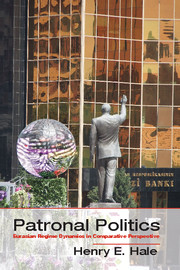Book contents
- Frontmatter
- Contents
- List of Figures
- List of Tables
- Acknowledgments
- Note on Transliteration
- 1 Introduction
- 2 Patronal Politics and the Great Power of Expectations
- 3 Eurasian History as Patronal Politics
- 4 Constitutions, Elections, and Regime Dynamics
- 5 The Emergence of Networks and Constitutions
- 6 The Building of Eurasia’s Great Power Pyramids
- 7 Revolutions and Other Presidential Ousters
- 8 Nonrevolution in Post-Soviet Presidential Systems
- 9 After Revolution
- 10 Patronal Parliamentarism
- 11 Explaining Post-Soviet Regime Dynamics
- 12 Patronal Politics in Global Comparative Perspective
- References
- Index
- References
10 - Patronal Parliamentarism
Published online by Cambridge University Press: 05 November 2014
- Frontmatter
- Contents
- List of Figures
- List of Tables
- Acknowledgments
- Note on Transliteration
- 1 Introduction
- 2 Patronal Politics and the Great Power of Expectations
- 3 Eurasian History as Patronal Politics
- 4 Constitutions, Elections, and Regime Dynamics
- 5 The Emergence of Networks and Constitutions
- 6 The Building of Eurasia’s Great Power Pyramids
- 7 Revolutions and Other Presidential Ousters
- 8 Nonrevolution in Post-Soviet Presidential Systems
- 9 After Revolution
- 10 Patronal Parliamentarism
- 11 Explaining Post-Soviet Regime Dynamics
- 12 Patronal Politics in Global Comparative Perspective
- References
- Index
- References
Summary
If strong presidencies tend to promote single-pyramid systems and if prime ministers reflecting parliamentary authority in a divided-executive system tend to restrain them, then it might seem logical to go one extra step and conclude, as one article’s title puts it, “stronger legislatures, stronger democracy.” This does not follow from the logic of patronal politics, however. The “stronger legislatures, stronger democracy” logic assumes constitutions endow an office with powers by stipulating them in a formal constitution. Patronal politics trains our attention instead on how what is written in constitutions shapes what people expect from politics in the real world and thus influences both constitution-observing and constitution-violating behaviors. And when one looks at what kind of expectations are promoted by parliamentarist constitutions, we see that such constitutions are quite capable of facilitating the emergence of single-pyramid systems much as presidentialist ones are. These effects are somewhat weaker, however, and can be influenced strongly by precisely how formal executive power is arranged by the parliamentarist constitution.
A parliamentarist constitution is one in which the parliament itself formally fills the most important offices of executive power, and this usually means either that there is no directly elected presidency or that any such presidency is allocated only minor or ceremonial formal authority. From the patronal politics perspective, parliamentarist constitutions differ from presidentialist and divided-executive ones in at least two ways that have important implications for regime dynamics. Here we step beyond what was discussed in Chapter 4 and label these ways executive divisibility and the number of formal selectorates.
- Type
- Chapter
- Information
- Patronal PoliticsEurasian Regime Dynamics in Comparative Perspective, pp. 372 - 421Publisher: Cambridge University PressPrint publication year: 2014



